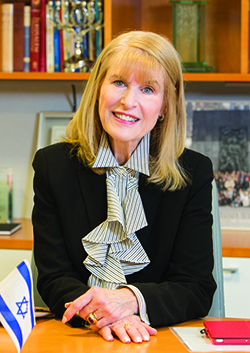Hadassah
President's Column
Making Waves
 We all know the importance of cooperation. It allows communities and nations to prosper, ideas to be heard, health and technology to advance, the powerless and marginalized to overcome discrimination.
We all know the importance of cooperation. It allows communities and nations to prosper, ideas to be heard, health and technology to advance, the powerless and marginalized to overcome discrimination.
Hadassah was built on cooperation. Jewish women were a dormant force until our founders organized and began building—becoming pivotal to the birth and welfare of Israel and instrumental in the advance of medical science on a global scale.
But the quest to build better lives and extend the benefits of medicine never ends. Even in our time, women’s rights and health care are often second-class concerns.
The good news is that our efforts will now be multiplied. In April, Hadassah launched the Coalition for Women’s Health Equity, a national movement to address gender inequities in medicine. The coalition brings together 15 of America’s most influential women’s and health organizations to address policies and practices that impact every woman’s life.
Most diseases affect men and women, but clinical studies have traditionally focused disproportionately on men—impeding our understanding of how gender affects prevention, diagnosis, treatment and outcome. Heart disease, for example, is the number one killer of women, yet only one-third of cardiac research subjects are female. Studies show that medical providers are more likely to attribute women’s pain symptoms to stress or psychological causes, and men’s symptoms to physical or neurological conditions.
Women and men often manifest different symptoms for the same disease and have divergent reactions to drugs, medical devices and treatments. Gender disparities—among research subjects and in health care access and delivery—put women at risk for misdiagnosis, ineffective treatment and compromised care. In 2013—after reviewing proof that the original research was incomplete—the F.D.A. cut in half the recommended dose of the sleep aid Ambien for women. We metabolize the drug more slowly and may be impaired for a longer period—putting us at risk for driving and other accidents. The Government Accountability Office found that 8 of 10 drugs pulled from the market from 1997 to 2000 posed greater health risks to women.
Hadassah has long advocated for Gender Equity in Medical Research (GEM) through community education, letters to elected officials and our Day in the District program. We have been instrumental in gaining congressional sponsors for the Research for All Act, which will mandate that all medical studies funded by the National Institutes of Health include adequate levels of female subjects and analyze male-female differences.
The member organizations of the Coalition for Women’s Health Equity will cooperate to inform the public and meet with and brief public officials. As part of Women’s Health Week in May, we educated policymakers and our grassroots networks—in Washington, online and in communities across the country—about gender disparities in medicine.
We can all be proud that Hadassah, as the founder of this coalition, is helping to shape the future of medicine, not just in Israel but also in America and around the world. Our combined efforts will give a powerful boost to advocacy, mobilization and sharing of resources. For the latest updates about the coalition, be sure to register for Hadassah’s advocacy alerts and go to our website—where you can also see the list of the coalition’s member organizations.
You can learn more about coalition efforts and action plans—and about many other programs and initiatives—at our National Convention in Atlanta, July 25 to 28. Our convention is always an inspiring event, allowing us to see and feel the power and synergy of our collective wisdom, experience and passion.
There’s an adage that says, “Individually, we are one drop. Together, we are an ocean.” To which I would only add: Let’s make some waves.










 Facebook
Facebook Instagram
Instagram Twitter
Twitter
Leave a Reply